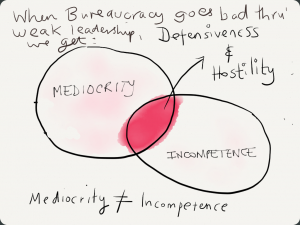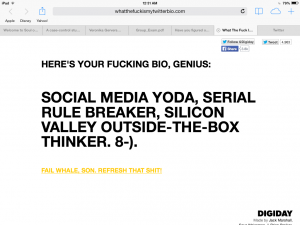In 2006, when I took over as director of York University's Institute for Research and Innovation in Sustainability (IRIS), I was very concerned with how to improve my skill set for effective leadership and management.
In many ways, my experience as a sustainability researcher from 2006-14 was as much about observing and learning from other senior people's often botched attempts at leadership and management, as about my own daily attempts to get out of bed and be an effective institution-builder for IRIS, York University, and the broader research and learning sustainability community.
A shockingly high number of people would ask me how they could become a director of their own research institute. They didn't want to join IRIS, but only wanted to find out if I could help them to get their own gig: ie they wanted their own vanity project. I'd shake my head and mutter to myself, "there's no I in team".
There were also people who wanted IRIS to advertise their achievements or to give them money, or get it for them, but they didn't want to do anything in return for us. Hello, have you never heard of a quid pro quo?
In the 1990s, when I was getting tenure, I coined the term, Rampant Self-Promoter or RSPs, to describe these folk, who were usually male, though, not always. Whatever we call them: narcissists or egotists, I mostly came to think of them as just really annoying, selfish people, who needed a truck to transport their egos. I also witnessed quite senior people, already in leadership positions, fail to give credit and attribution to others for various projects. This happened surprisingly often. It led me to ask, early on, about the causes of such unethical leadership and management behaviour.
Ep 5 of activist accounting prof @SchulichSchool, @camerongraham’s #Highered podcast is out!
My @pcast_or_perish intvu answers why I’ve been described as unstoppable, a force of nature & ruder terms.#EDI #WomenInSTEM #RSP (learn this hashtag's meaning) https://t.co/N8YeSzWbU8 https://t.co/zxyoKmxFEI
— Dr. Dawn-I-really-❤️-my-lab-fumehood-Bazely 💨 (@dawnbazely) November 4, 2019

 During my time directing IRIS, I read loads of books and blogs about leadership, management and ethics. I even blogged about it. I still listen to podcasts on these topics. My current favourite is the General Leadership Podcast (it's short), from a group of former US military top brass. This might seem kinda weird, given what people may infer about my politics from my tweets, but it's not really, given my interest in the general attributes of good leadership and management. Plus, when I got to know the British Army, whose personnel provided essential logistical support for my field work on St. Kilda, I found that I loved working with true professionals who knew how to organize stuff and get it done. I also have close relatives who were, or are, in the armed forces and they have been in some tough situations.
During my time directing IRIS, I read loads of books and blogs about leadership, management and ethics. I even blogged about it. I still listen to podcasts on these topics. My current favourite is the General Leadership Podcast (it's short), from a group of former US military top brass. This might seem kinda weird, given what people may infer about my politics from my tweets, but it's not really, given my interest in the general attributes of good leadership and management. Plus, when I got to know the British Army, whose personnel provided essential logistical support for my field work on St. Kilda, I found that I loved working with true professionals who knew how to organize stuff and get it done. I also have close relatives who were, or are, in the armed forces and they have been in some tough situations.
 I believe in beneficial bureaucracy that serves the public good. But, I also know that too much bureaucracy can jam up the works and I have opinions, based on my observations and experience as to why this may be the case. I also learned long ago, that trust and respect must be earned and it's better to lead from the front than the back, especially when it comes to doing crappy, hard work. There is lots of research into how and why teams function well, in terms of their leaderships and ethics.
I believe in beneficial bureaucracy that serves the public good. But, I also know that too much bureaucracy can jam up the works and I have opinions, based on my observations and experience as to why this may be the case. I also learned long ago, that trust and respect must be earned and it's better to lead from the front than the back, especially when it comes to doing crappy, hard work. There is lots of research into how and why teams function well, in terms of their leaderships and ethics.
As I step back into being a common or garden, yet, hugely privileged tenured academic, I am concerned that the shifting framework of Higher Education in the Global North, means that the "collegium" framework of academia is on the way out, and has been replaced by a for-profit, corporate ethos (this is not 100% bad), in which the leadership and management of some massive institutions, is largely unaccountable. The issue is that there are weak to non-existent feedback loops between deans, vice-presidents, presidents etc and boards of governors and the faculty and students whose missions they serve. So, senior level administrators are able to put in their invisible earplugs and live in an echo chamber. The most recent example of what these kinds of disconnects lead to, is the debacle at the University of Saskatchewan.
There are many drivers of this shift, but one of my favourite hypotheses for why it's happening, is that, in my opinion, senior academic leaders and managers are, overall, tending to be, more often than in the past, mediocre to not very creative and innovative researchers, and also, people who don't much like students and teaching (they're easy to spot). But, here's the real problem, they also lack specific training in management and leadership. Many of these senior highered bureaucrats & deanlets seem to exhibit an extraordinary lack of self-awareness and self-reflection, whether or not they are academics, that would lead them to seek counsel and training. ie. they're never gonna call Marshall Goldsmith.
My current observations and experience stands in strong contrast to many people in top positions with whom I interacted and observed as a student & post-doc at University of Toronto, Massey College and the University of Oxford (through the 1980s) and also, during the 1990s, when I was a junior YorkU professor.
The leaders and senior managers, of both genders that I often encountered, were formidably accomplished people, with serious social skills and self-deprecating humour, like Sir Richard Southwood and Dame Daphne Park, to name just two, who could engage in spirited debate without open hostility. They would have loved Social Media: its seriousness & silliness (like the auto-twitter bio generator). They treated me with respect, and listened, even though I was very junior to them and held quite different political opinions and outlooks. Meeting this sort of person has become very rare in my academic life of the last 5-10 years. And the reasons for this are, in my view, not random.
Dawn Bazely
I updated this post in response to Prof. Shoshanah Jacob's tweet of June 11, 2021:
...and like an idiot, just the other day, I uploaded my cv for a grant application.
When will I start engaging in evidence-informed applying? #HigherEd #DiversifySTEM #AcademicChatter #AcademicTwitter https://t.co/3q8g4G2rSM pic.twitter.com/H4eppuY7j8
— Dr. Shoshanah Jacobs (@shoshanahjacobs) June 11, 2021


